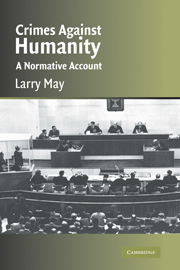Book contents
- Frontmatter
- Contents
- Acknowledgments
- A UNIVERSAL NORMS AND MORAL MINIMALISM
- B PRINCIPLES OF INTERNATIONAL CRIMINAL LAW
- C PROSECUTING INTERNATIONAL CRIMES
- D DEFENSES AND ALTERNATIVES
- 10 Superior Orders, Duress, and Moral Perception
- 11 The International Rule of Law
- 12 Victims and Convictions
- 13 Reconciliation and Amnesty Programs
- Conclusions
- Notes
- Bibliography
- Index
10 - Superior Orders, Duress, and Moral Perception
Published online by Cambridge University Press: 23 November 2009
- Frontmatter
- Contents
- Acknowledgments
- A UNIVERSAL NORMS AND MORAL MINIMALISM
- B PRINCIPLES OF INTERNATIONAL CRIMINAL LAW
- C PROSECUTING INTERNATIONAL CRIMES
- D DEFENSES AND ALTERNATIVES
- 10 Superior Orders, Duress, and Moral Perception
- 11 The International Rule of Law
- 12 Victims and Convictions
- 13 Reconciliation and Amnesty Programs
- Conclusions
- Notes
- Bibliography
- Index
Summary
The next two chapters consider various defenses that can be offered by those who are accused of genocide, crimes against humanity, and war crimes. I make no attempt to be comprehensive in examining possible defenses. Instead, I focus on those that are the most interesting from a philosophical point of view in light of our earlier discussions. Hence, in this chapter, I begin by examining the defense of superior orders (that one was just following orders), and eventually turn to the related defense of duress (that one had no reasonable choice). In Chapter 11, I examine several procedural “defenses” that would nullify the trial itself – that the trial involved an ex post facto proceeding, that the defendant had been singled out for selective prosecution, and that the punishment did not fit the crime for which the defendant had been charged. A consideration of these procedural defenses will lead to an examination of the rule of law in international prosecutions. In general, I argue for an expanded understanding of these defenses.
In 1946, the Nuremberg Trials were begun, attempting to bring to justice the perpetrators of the Holocaust, among others. Politically, what was groundbreaking was that the trials were based on international norms rather than the laws of any particular country, and that most of the defendants were former members of the German military forces being tried on German soil largely by non-Germans.
- Type
- Chapter
- Information
- Crimes against HumanityA Normative Account, pp. 179 - 200Publisher: Cambridge University PressPrint publication year: 2004



